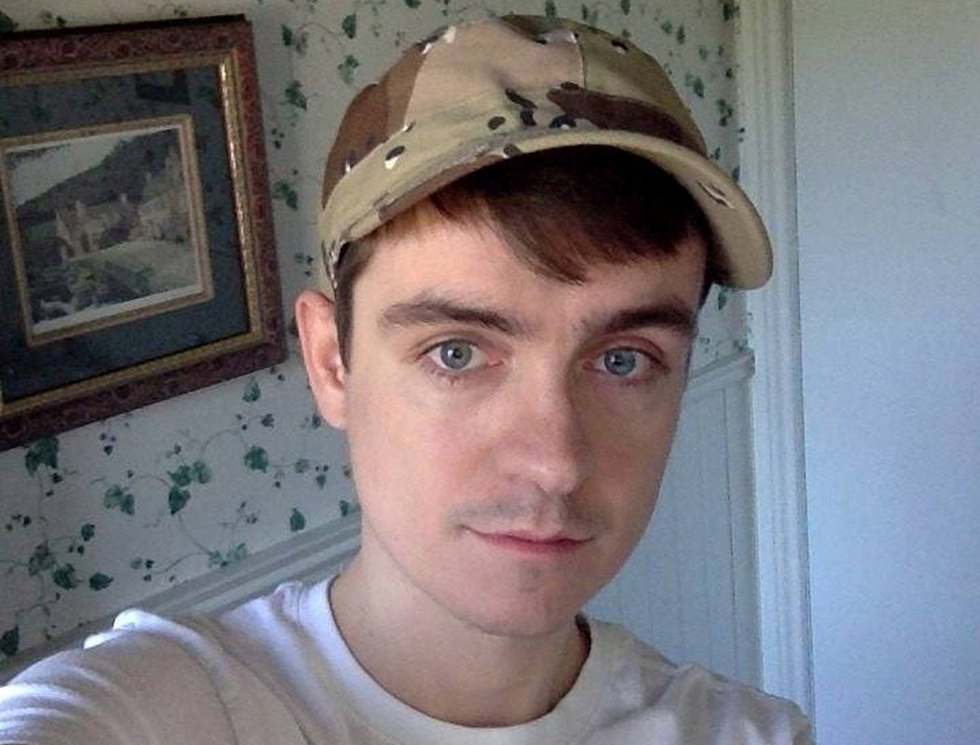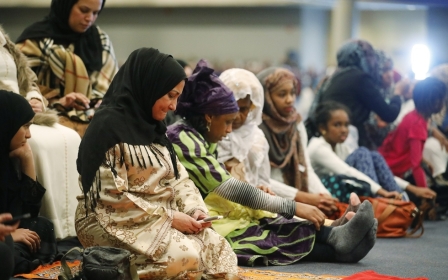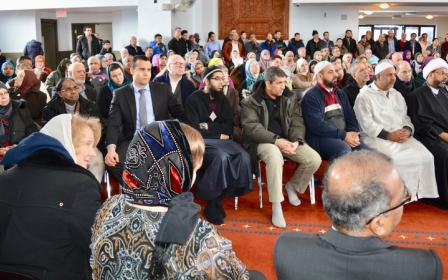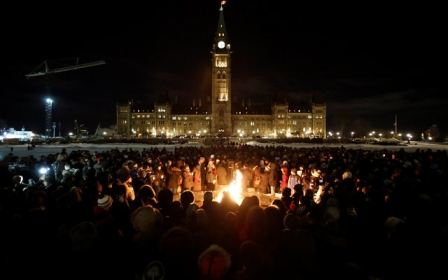Why terrorism charges won't be filed in deadly Quebec mosque attack

MONTREAL, Canada – Mohamed Labidi had few words.
The interim president of the Islamic Cultural Centre of Quebec, the mosque where six Muslim men were shot and killed earlier this year as they prayed, said his community is still coping with the deadly attack.
Now, a decision not to file terrorism charges against the accused shooter has left Muslims in Quebec City - and in communities across Canada - reeling once more.
Crown prosecutors in Quebec announced earlier this week that the suspect in the case, Alexandre Bissonnette, 27, was being charged with six counts of murder and six counts of attempted murder using a restricted firearm.
But no terrorism charges were filed.
“People are disappointed,” Labidi told Middle East Eye in a telephone interview on Wednesday. “We think there are calculations” being made, he said.
“They don’t want to hurt the image of Canada and of Quebec.”
‘Despicable act of terror’
Like Labidi, many Canadians have expressed confusion over the decision not to file terrorism charges against Bissonnette, a university student who reportedly espoused extreme right-wing views and was known for harassing pro-refugee activists online.
Bissonnette is expected to go straight to trial without a preliminary hearing. His next court date is 11 December, when a day will be set for his trial before a judge and jury.
Things are especially muddled in light of the public statements that came from the highest levels of Canadian politics to condemn the 29 January shooting in the main prayer room of the Quebec City mosque.
At the time, Quebec Premier Philippe Couillard described the attack as an act of terrorism and Canadian Prime Minister Justin Trudeau said it was a “despicable act of terror”.
“This was a group of innocents targeted for practicing their faith. Make no mistake – this was a terrorist attack,” Trudeau said in the House of Commons the day after the shooting.
For Muslim-Canadians, there are concerns that not filing terrorism charges now “sends the wrong signal,” said Faisal Bhabha, a legal adviser to the National Council of Canadian Muslims, a national advocacy group.
Bhabha told Middle East Eye the case raises the perception of a double standard based on the identity of the suspect in these types of violent attacks.
He said people are asking the question: “Why, when a white guy does something like this, he’s just a murderer, but when a Muslim guy … does something like that, he’s a murderer, but he’s also a terrorist?”
Legal considerations
But legal experts, including Bhabha himself, say it isn’t wholly surprising that prosecutors didn’t tack terrorism charges onto Bissonnette’s case.
Under Canadian law, a terrorism charge must meet a higher standard of proof than a murder charge. On a terrorism offence, prosecutors must prove motive; with a murder charge, they must prove that a suspect committed or attempted to commit the act.
Canada’s Anti-Terrorism Act defines terrorism as any act inside or outside Canada “for a political, religious or ideological purpose that is intended to intimidate the public with respect to its security”.
However, that can be difficult to prove, especially if a suspect acted alone and isn’t talking to police under interrogation, said Lorne Dawson, a professor at the University of Waterloo in Ontario whose work focuses on terrorism and radicalisation to violence.
“I’m not surprised that charges weren’t laid because they have him dead to rights on the homicide charges,” Dawson told Middle East Eye about the Quebec City case.
While there is “public and symbolic value in levelling a terrorism charge,” Dawson said doing so creates increased legal and investigative work for prosecutors and can leave their entire case more vulnerable.
“It creates a weak link that could be exploited by the defence,” he said.
‘A weird kind of weapon’
The way terrorism laws have been written in Canada makes it more likely they will be used in cases where a person hasn’t committed a crime punishable under criminal law.
That’s because several components of the law make it a crime to provide material or other kinds of support for terrorism, conspiring to commit a terrorist act, or “even just simply being a member of a terrorist organisation,” Dawson said.
“It’s a weird kind of weapon,” Dawson said, pointing to several recent cases that demonstrate just how tricky the system is.
An Ontario man, Aaron Driver, came to the Canadian authorities’ attention through radical statements he made online and because he was reportedly communicating with members of the Islamic State (IS) group.
But police didn’t have anything to charge him with, so instead they put him under a peace bond, a legal mechanism that can restrict a person’s freedom of movement and other rights.
“It’s a much lower standard,” Dawson said about a peace bond. “You just have to convince a judge that the person may go on to some kind of action.”
After his bond conditions were lessened, Driver eventually went on to plan a bombing in southern Ontario. But he detonated the bomb early, in a taxi, when confronted by police in August 2016 and Driver was killed.
In the Toronto 18 case - a group of adults and minors who were charged with plotting to carry out a series of attacks in southern Ontario - police arrested the suspects after infiltrating the group and collecting audio and video recordings of them plotting and conspiring to commit acts of violence.
But the cases of Bissonnette, the suspected shooter in the Quebec City mosque attack, and Abdulahi Sharif, an Edmonton man charged with stabbing a police officer and hitting four pedestrians with a truck on 30 September, are different.
Both suspects are “lone actors” and don’t appear to formally belong to any group, they haven’t plotted with anyone and there is no audio or video evidence of them planning their action, Dawson said.
Without any such evidence, the cases fall back on motivation to prove terrorism-related charges, and prosecutors may not meet a high enough standard of proof.
Anti-terrorism laws ‘a political tool’
Bhabha said the National Council of Canadian Muslims is not calling for harsher terrorism legislation in Canada despite being critical of the decision in the Quebec City case.
Instead, he said the situation demonstrates “that you can fight terrorists with criminal law and anti-terrorism legislation ends up being really just a political tool that harms Muslims and those associated with Muslims”.
Meanwhile, Bhabha said Muslim-Canadians are still coping with the attack in Quebec City, which he described as “the greatest act of mass murder violence committed on Canadian soil in decades”.
With this decision, feelings of bewilderment and fear in the community will persist, he said.
“I think they’re feeling left behind again.”
Middle East Eye propose une couverture et une analyse indépendantes et incomparables du Moyen-Orient, de l’Afrique du Nord et d’autres régions du monde. Pour en savoir plus sur la reprise de ce contenu et les frais qui s’appliquent, veuillez remplir ce formulaire [en anglais]. Pour en savoir plus sur MEE, cliquez ici [en anglais].




